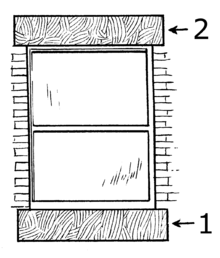sill
English

2: Lintel
Pronunciation
Etymology 1
From Middle English sille, selle, sülle, from Old English syll, syl (“sill, threshold, foundation, base, basis”), from Proto-Germanic *sulī (“bar, sill”), from Proto-Indo-European *sel-, *swel- (“beam, board, frame, threshold”). Cognate with Scots sil, sill (“balk, beam, floor, sill”), Dutch zulle (“sill”), Low German Sull, Sülle (“threshold, ramp, sill”), Danish syld (“base of a framework building”), Swedish syll (“joist, cross-tie”), Norwegian syll, Icelandic syll, sylla (“sill”). Related also to German Schwelle ( > Danish svelle), Old Norse svill, Latin silva (“wood, forest”), Ancient Greek ὕλη (húlē).
Noun
sill (plural sills)
- (architecture) (also window sill) A horizontal slat which forms the base of a window.
- She looked out the window resting her elbows on the window sill.
- (construction) A horizontal, structural member of a building near ground level on a foundation or pilings or lying on the ground in earth-fast construction and bearing the upright portion of a frame. Also called a ground plate, groundsill, sole, sole-plate, mudsill. An interrupted sill fits between posts instead of being below and supporting the posts in timber framing.
- (geology) A horizontal layer of igneous rock between older rock beds.
- 1980, U.S. Government Printing Office, Geological Survey Professional Paper, Volume 1119
- Minor palingenetic magmas probably were generated at this time and intruded the mantling rocks in the form of small sills and apophyses; […]
- 1980, U.S. Government Printing Office, Geological Survey Professional Paper, Volume 1119
- A piece of timber across the bottom of a canal lock for the gates to shut against.
- (anatomy) A raised area at the base of the nasal aperture in the skull.
- the nasal sill
- (military, historical) The inner edge of the bottom of an embrasure.
Usage notes
Usually spelled cill when used in the context of canal or river engineering.
Quotations
- For quotations using this term, see Citations:sill.
Derived terms
Related terms
Translations
|
|
- The translations below need to be checked and inserted above into the appropriate translation tables. See instructions at Wiktionary:Entry layout § Translations.
|
Etymology 2
Compare sile.
Noun
sill (plural sills)
Etymology 3
Compare thill.
Noun
sill (plural sills)
Anagrams
Swedish
Etymology
From Old Norse síld, from Proto-Germanic *sīlą.
Pronunciation
Noun
sill c
- a herring
Usage notes
- Herring from the Atlantic on Sweden's west coast is called sill. The subspecies fished from the Baltic Sea on Sweden's east coast is called strömming.
Declension
| Declension of sill | ||||
|---|---|---|---|---|
| Singular | Plural | |||
| Indefinite | Definite | Indefinite | Definite | |
| Nominative | sill | sillen | sillar | sillarna |
| Genitive | sills | sillens | sillars | sillarnas |
See also
References
- Harris, Cyril M.. Illustrated dictionary of historic architecture. New York: Dover Publications, 1983, 1977. Groundsill →ISBN
- English 1-syllable words
- English terms with IPA pronunciation
- Rhymes:English/ɪl
- English terms derived from Middle English
- English terms derived from Old English
- English terms derived from Proto-Germanic
- English terms derived from Proto-Indo-European
- English lemmas
- English nouns
- English countable nouns
- en:Architecture
- en:Construction
- en:Geology
- en:Anatomy
- en:Military
- English terms with historical senses
- British English
- Swedish terms derived from Old Norse
- Swedish terms derived from Proto-Germanic
- Swedish terms with audio links
- Swedish terms with IPA pronunciation
- Swedish lemmas
- Swedish nouns
- Swedish common-gender nouns